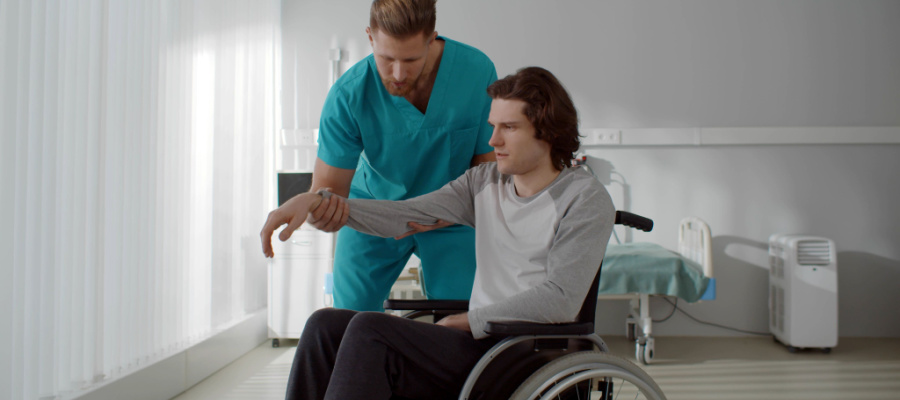What is the Last Stage of Paralysis?
Paralysis can be a life-altering condition, affecting an individual’s ability to move and perform daily activities. For those living with paralysis, understanding the progression of the condition and its various stages can help them prepare for the challenges they might face and access the care and support they need. In particular, many people with paralysis are concerned about what the last stage of paralysis entails.
At Devoted Helpers, a compassionate home care agency in Sugar Land, Texas, we understand that every individual’s experience with paralysis is unique. In this article, we’ll explore the last stage of paralysis, what it means for the individual, and how Devoted Helpers supports individuals in the final stages of paralysis to ensure their comfort and quality of life.
What is Paralysis?
Paralysis occurs when there is a loss of muscle function and sensation in one or more parts of the body due to damage to the nervous system, particularly the spinal cord or brain. Depending on the location and severity of the injury or illness, paralysis can be partial or complete, affecting either one part of the body or multiple limbs.
The stages of paralysis vary based on the cause, which could include spinal cord injury, stroke, neurodegenerative diseases like ALS (amyotrophic lateral sclerosis), multiple sclerosis, Parkinson’s disease, or trauma. For some, paralysis progresses gradually, while for others, it occurs suddenly after an event like an accident or stroke.
The Last Stage of Paralysis – What Does It Involve?
The last stage of paralysis refers to the point at which the individual’s condition has reached its most advanced and often irreversible point. In this final stage, the effects of paralysis become more profound, and the individual’s ability to function independently diminishes further. While the experience of the last stage of paralysis can differ greatly depending on the underlying cause, there are a few common factors to consider.
a. Progressive Loss of Function
For individuals with neurodegenerative conditions like ALS or Parkinson’s disease, the last stage of paralysis often involves the progressive loss of function. Over time, patients may lose the ability to move their limbs, speak, or even breathe without assistance. For ALS patients, this typically means the loss of voluntary muscle control, leading to complete paralysis of the body.
In other cases, such as with spinal cord injury, the last stage may involve a complete loss of motor and sensory function below the level of injury. Those who experience quadriplegia (paralysis of all four limbs) may experience the final stages of paralysis where even basic bodily functions become difficult without medical or caregiving support.
b. Respiratory Complications
As paralysis progresses, individuals may experience difficulty breathing, particularly if the muscles responsible for breathing are affected. This can lead to respiratory failure—a major concern in the last stage of paralysis. Individuals with paralysis, especially those with high-level spinal cord injuries (e.g., cervical injuries), may require a ventilator or oxygen therapy to assist with breathing.
Many patients with advanced paralysis may experience difficulty swallowing, leading to a risk of aspiration (food or liquids entering the airway) and aspiration pneumonia. In this stage, nutritional support, careful monitoring, and medical interventions are vital to maintaining health and comfort.
c. Pressure Ulcers and Skin Issues
As individuals with paralysis become less mobile, pressure ulcers (also known as bedsores) can develop, especially in areas where prolonged pressure is placed on the skin, such as the back, heels, hips, and buttocks. In the final stages of paralysis, managing pressure sores becomes critical, as they can lead to infections and other serious complications if not treated promptly. Regular repositioning, proper wound care, and supportive skin care are key to preventing and treating these sores.
d. Cognitive and Emotional Effects
While paralysis itself affects the body, the emotional and psychological effects can be just as challenging. The last stage of paralysis may involve heightened levels of depression, anxiety, and mental fatigue. As individuals face the loss of mobility and independence, they may experience feelings of grief, helplessness, or isolation. Access to mental health support and counseling is important to help individuals and their families cope with the emotional challenges of this stage.
Care and Support During the Last Stage of Paralysis
At the last stage of paralysis, individuals often require around-the-clock care and medical support to manage their physical, emotional, and psychological needs. The level of care needed will depend on the specific circumstances and the progression of the paralysis. Some of the services that can provide comfort and improve quality of life during this stage include…
a. In-Home Care
For individuals in the final stages of paralysis, in-home care can offer specialized assistance in a familiar and comfortable setting. Devoted Helpers in Sugar Land, Texas, offers skilled caregivers who can provide 24/7 support, including help with activities of daily living (ADLs) such as bathing, dressing, and eating. In addition, caregivers can assist with mobility, medication management, wound care, and emotional support for both the patient and their family.
b. Pain and Symptom Management
At the last stage of paralysis, managing pain and other symptoms is crucial. Palliative care can play an essential role in ensuring comfort, offering relief from physical discomfort, respiratory difficulties, and emotional stress. Devoted Helpers works closely with families and healthcare professionals to implement effective pain management strategies and improve the patient’s overall quality of life.
c. Mental and Emotional Support
Caregivers also provide vital emotional support during this challenging stage. Many individuals with paralysis in the final stage require companionship, encouragement, and assistance with managing the mental and emotional toll of their condition. Access to professional counseling, spiritual care, and support groups can help patients and families navigate this emotional journey.
d. Respite Care for Family Caregivers
For family members who are caregivers, the last stage of paralysis can be physically and emotionally draining. Respite care offers family members the opportunity to take a break while ensuring that their loved one continues to receive the care and attention they need. Whether for a few hours or a few days, respite care is a valuable support service for caregivers who may need time for self-care and recovery.
How Devoted Helpers Can Assist in the Last Stage of Paralysis
At Devoted Helpers, we are dedicated to providing high-quality, compassionate care to individuals facing the last stages of paralysis. Our experienced team of caregivers works closely with patients and their families to create a personalized care plan that addresses the individual’s needs and preferences.
Some of the services we provide include…
- 24/7 in-home care – Assistance with daily activities and ensuring comfort and safety.
- Pain and symptom management – Collaboration with healthcare providers to manage physical symptoms.
- Emotional and mental support – Providing companionship, spiritual care, and psychological support.
- Respite care – Giving family caregivers the time they need for rest and rejuvenation.


